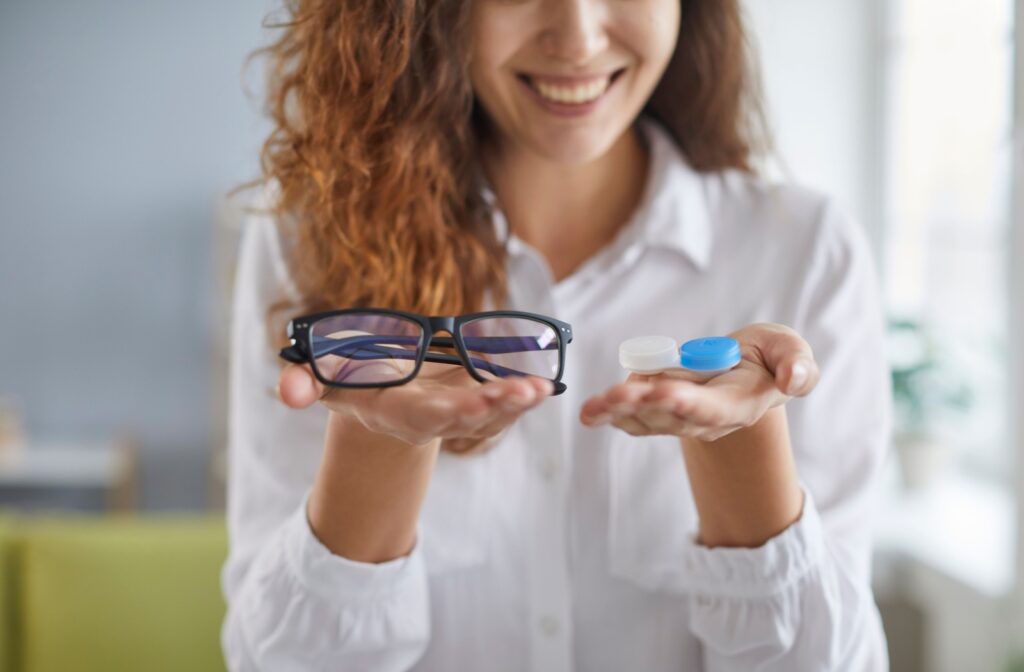Myopia, or nearsightedness, is a common vision problem where distant objects appear blurry because the eye is too long, causing light to focus in front of the retina. Both spectacles (glasses) and contact lenses are effective at correcting myopia, but contact lenses, particularly specialty options, tend to offer better control over myopia progression. The choice between glasses and contacts depends on personal preference, lifestyle, and specific needs, so it’s important to consult with your eye care provider.
What is Myopia?
Myopia, also known as nearsightedness, is a common vision condition where distant objects appear blurry while close-up objects can be seen clearly. It happens because the eye is too long, causing light to focus in front of the retina instead of directly on it. Myopia affects nearly 30% of Canadians and is becoming more widespread, especially in children.
What are the Options for Myopia Control?
When it comes to myopia management, both glasses and contact lenses have their unique benefits and drawbacks. The best choice for you or your child will depend on individual needs, preferences, and lifestyle. Let’s explore both options.
Glasses for Myopia
Pros:
- Comfort & convenience: Glasses are easy to wear, remove, and maintain. Unlike contact lenses, there’s no need for cleaning or worrying about inserting or removing them.
- Suitable for younger children: Glasses can often be used at a younger age compared to contact lenses, making them a good option for children just starting to need vision correction.
- Myopia control: Certain types of eyeglass lenses, like myopia control lenses, have been proven to slow down myopia progression by about 15-30%. This can help reduce the risk of severe vision problems in the future.
Cons:
- Easier to lose or damage: Glasses can be misplaced or broken more easily than contact lenses, especially in active children or people who are frequently on the go.
- Limited myopia control: While helpful, traditional eyeglasses may not provide the same level of myopia control as other specialized options, such as contact lenses or specific myopia management treatments.
Contact Lenses for Myopia
Pros:
- More effective myopia control: Contact lenses have been shown to reduce the progression of myopia by up to 40% or more. Some specialized lenses, like MiSight contact lenses, can slow myopia progression by as much as 59%, making them a more effective option for myopia control than regular glasses.
- Peripheral vision benefits: Unlike glasses, contact lenses can correct peripheral vision as well, helping to provide a more natural and comfortable visual experience.
- No discomfort from fogging or rain: Since contact lenses are worn directly on the eye, they won’t fog up or get splattered with rain like glasses can.
Cons:
- Requires care & maintenance: Contact lenses must be properly cleaned and cared for to prevent eye infections or discomfort. Additionally, they can be tricky to insert or remove, especially for young children or first-time users.
- Not ideal for young children: Children under the age of 8 may have trouble inserting, removing, and maintaining contact lenses on their own, which can be a barrier to their use. They also need to be properly trained on lens hygiene.
- Potential for dry eyes or discomfort: Some people may experience dry eyes or irritation with prolonged contact lens use, especially in dry or dusty environments.
Why Is Managing Myopia Important?
Myopia doesn’t just impact vision. The longer someone remains undiagnosed or untreated, the more likely they are to experience complications such as:
These conditions can lead to severe, long-term vision problems if not addressed early. Therefore, early detection and proactive management of myopia are crucial to reducing the risk of these complications.

Myopia Control Options: Glasses and Contact Lenses
Glasses: Specialized eyeglass lenses designed for myopia control, like Hoya’s Miyosmart or Essilor’s Stellest lens, use a principle called peripheral defocus to help slow down myopia progression. These lenses are effective in controlling the elongation of the eye, which is the main cause of myopia. For children, Zeiss Myokids helps reduce accommodative lag, which may slow the rate at which myopia progresses.
Contact Lenses: There are several types of contact lenses specifically designed for myopia control, including MiSight contact lenses. These lenses, which are FDA-approved, use peripheral defocus to slow myopia’s progression and are widely considered the gold standard for myopia management..
Myopia Management in Vancouver, BC
Ultimately, whether you choose glasses or contact lenses for managing myopia, the key is to start early and regularly monitor the condition. Both glasses and contacts can help control myopia, but the best choice depends on your individual needs and preferences. Be sure to consult with an eye care professional who can guide you toward the right solution.
If you’re ready to take the next step in managing your or your child’s myopia, schedule an appointment with us at Vancouver Block Optometrists. Our team is dedicated to helping you find the most effective solutions for better vision and long-term eye health. Don’t wait—take action today to protect your eyes for tomorrow. Schedule your appointment now!

